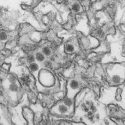UW-Madison continues to address gastroenteritis outbreak
The University of Wisconsin–Madison continues to monitor reported cases of gastroenteritis among students and provide information to help limit the spread of disease, following the first cases of suspected norovirus that were seen at University Health Services on Nov. 7.
“We have expanded notification to all students on campus, and we are continuing to expand our surveillance areas,” says Sarah Van Orman, executive director of University Health Services (UHS).
An e-mail advising students to use extra hand-washing precautions and advising how best to care for themselves if they fell ill was sent to all students today (Nov. 14). Additional information about how to clean residences where people have been sick was posted to the UHS Web site.
“In addition to practicing good hygiene,” says Van Orman, “we want students to learn what they can do to care for themselves if they develop symptoms and encourage them to contact UHS if they have questions about any illness they’re experiencing.”
Since Nov. 7, University Housing has reported 63 students in Sellery Hall with illness characterized by vomiting and diarrhea. Sellery houses 1,100 residents. University Housing staff continue to implement stringent cleaning procedures to control the spread of illness.
On Nov. 13, UHS received reports of several dozen sick students in some of the sorority and fraternity houses and a few suspected cases among students living in off-campus housing.
“We are asking lots of people to give us information, and as a result, we are hearing about cases in more locations than we would in a typical year,” says Van Orman. “It’s important to remember that norovirus is always present in the environment, especially in winter, and lots of different people can come down with ‘stomach flu’ separately without necessarily having caught it from each other.”
Today’s e-mail asked residence managers in fraternities and sororities and off-campus housing to alert UHS if they encountered residents with symptoms of gastroenteritis. A second e-mail went out to UW–Madison faculty and staff.
“We have sent cultures to the laboratory,” says UHS epidemiologist Craig Roberts, “and are attempting to confirm the cause of the outbreak. We are coordinating with the Wisconsin Division of Public Health.
“We continue to suspect a norovirus,” adds Roberts, “but regardless of the cause, the hand-washing and cleaning precautions we have recommended are appropriate for the symptoms we’re seeing and should help limit the spread of illness.”
Norovirus is easily transmitted from person to person via contaminated hands, surfaces or foods. It is characterized by acute gastrointestinal illness with vomiting and diarrhea. Symptoms are usually very sudden in onset, may be severe and typically resolve within 24-48 hours. Self-care consists primarily of drinking small amounts of clear fluids throughout the day to prevent dehydration.
“At UHS, we’re seeing a few students who have become more severely dehydrated, but that’s a minority of the ones affected,” says Van Orman. “Most are able to care for themselves until the symptoms pass.
“Students should be vigilant about washing their hands with soap and water and alcohol-based hand sanitizer,” Van Orman adds, “especially after they have used the bathroom and before eating or preparing food.”
Students who are sick are being encouraged to stay home from class and work and avoid large gatherings.


